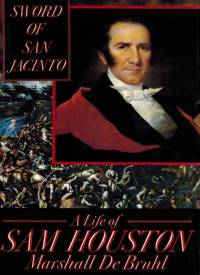"Sam Houston was one of the most remarkable figures in American history. He was a native of Virginia who as a soldier, stateman, and adventurer made his mark on the frontier in Tennessee and the Arkansas Territory and then went on to dominate the early history of Texas. Now, drawing on newly accessible archival material, in particular the more than five thousand letters and documents in the Andrew Jackson Houston Collection of the Texas State Archives, historian Marshall De Bruhl vividly re-creates the career of this larger-than-life hero. In a narrative brimming with fascinating details, De Bruhl captures Houston in all his complexity.
A frontiersman who lived among the Cherokee Indians for many years - he was the adopted son of Chief Ooleteka and a full citizen of the Cherokee Nation - Houston became a passionate defender of Indian rights. As a soldier, Sam Houston served under Andrew Jackson in the War of 1812 - and ensured Texas independence in 1836 with his atonishing victory over Santa Anna and the Mexican army at San Jacinto. As a politician, Houston was a Tennessee congressman at age thirty and then governor at age thirty-six. He then went on to be the first elected president of the Republic of Texas and one of the first senators from the new state. Because of his ardent defense of the Union and his refusal to swear allegiance to the Confederacy, he was deposed as governor of Texas in 1861.
Houston's personal life was as tumultous as his political and military careers. He married three times, always to much younger women. The first marriage, to an eighteen-year-old, ended mysteriously when she left him only eleven weeks later, whereupon he resigned the governership of Tennessee and fled to the west and exile among his old Cherokee friends. It was there he married Tiana, the beautiful niece of Chief Ooleteka. Years later, at age forty-six, he married a woman of twenty, who bore eight children during their devoted and happy marriage. Although Houston died ignored and vilified by those whose independence who had ensured, the eclipse of his reputation was brief. His fellow Texans soon acknowledged his central place in their history, and he is revered today as the father of Texas and [as] its greatest hero."

